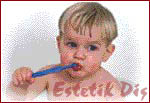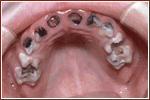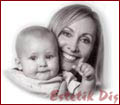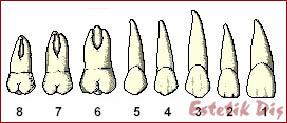|

Why children’s’ teeth get decayed?
Milk teeth are richer with organic substances than the normal teeth. Because of this they are more inclined to decay easily and quickly.
Children cannot explain sensitivity to hot and cold and pain signals occurring in early period of caries. They get aware of the situation when it becomes too late. The children cannot pay attention to the care of their teeth as do the adults. The child’s habits, interest and parents’ positions determine his teeth brushing habits.
One of the often met mistakes of mothers is to dip the baby's pacifier to sugar, jam or other such kind of food and to give it to the child or to give fruit juice or sweet milk to the babies between sleeping times. Such kind of imbalanced nutrition make the teeth decay.
Can we prevent caries?
Yet there exists no inoculation or medicine preventing caries. But there are some remedies which are being used at present time; one of the remedies is “fissure covering”. Tooth decays usually occur in the hallows, called “fissures” located at masticating surfaces of incisors and small incisors. By means of ‘fissure covering” channels are covered preventing microbes, food debris etc. to be gathered there and thus occurrence of decay is prevented. This operation can be applied on permanent incisors and small incisors which have come out since 6 years old. Another way to prevent decays is to increase resistance of teeth against the decays. The resistance is increased by applying fluoride to surface of teeth.
Must the decays occurring in milk teeth be treated?
The decays in milk teeth which are not treated can cause pain, smell, biting difficulties, nutrition imbalance and ugly appearance. Not treated teeth in this period can be the reason of tooth disorders, tooth curvatures, disorders in chin development and general health problems (from rheumatism till heart diseases). Because of this tooth decays must be treated without thinking that ‘in any case they will be replaced by new ones”. The decays in milk teeth may cause the baby to get acquainted with the pain in an early age and occurrence of fears in future. Besides it, decays can cause loss of milk teeth very early.

Tooth wounding in children
In accidents where children are injured must be intervened without losing time. Here it is of utmost importance to make a right diagnosis. For this your doctor will ask you about the time and the place of the accident, as well as if the child has fainted away, vomited etc after the accident. Taking into consideration the information, the doctor will apply the most right treatment way. Tooth wounding in children sometimes can cause the entire tooth can come out from its alveolar. In this case you must take the child together with the tooth to the doctor immediately. The tooth must be taken to the doctor in a glass of milk or clean water.
.
Dental care for children
Feeding babies with breast milk at least during first four months will provide normal development of soft tissues and functions of muscles around mouth. If mother’s milk is not satisfactory, baby pacifier with physiological top (with gum and cut edge) must be used. The babies must be adapted to the usage of glass and spoon since the 1st month. Feeding with baby pacifier can last until 1 years old. Habits like finger sucking and pacifier using can be permitted until 2-2.5 age. If the habit of finger sucking exists in 3-6 years, its reason must be researched and liquidated. Because it can cause breathing problems and can have negative impact on development of jaw. If breathing takes place not via nose, but via mouth (it is clearly seen while the child sleeps), you should consult with ear, nose, throat specialist
WHEN THE CHILDREN MUST BEGIN TO BRUSH THEIR TEETH?
When the baby is of 6-8 months (i.e. when the child has its first teeth), cleaning operations must be started. After the lunch and before the night sleep it is recommended to clean at least surface of the teeth with wet gauze. The toothbrush can be used when the child has its posterior teeth (approximately 2.5-3 years old).
It is difficult to implement one method for the children below school age. In this period it is important for a child to acquire tooth cleaning habits. The children usually brush only those parts of the teeth which are easily seen. However for prevention of decays, it is necessary to clean the interdental spaces and masticator surfaces. Because of this, the parents’ control in the process is recommended

What kind of toothbrush is recommended for children?
The child must use a toothbrush suitable for his mouth size and made of soft and nylon bristles. Hard bristles are not recommended, as they erode the teeth. As an old broom cannot sweep well, neither an old toothbrush can clean well. The toothbrush must be replaced as soon as its bristles spoil (approximately every 6 months).
HOW OFTEN MUST CHILD BRUSH ITS TOOTH?
Children must brush their teeth after the lunch and before sleeping for 3 minutes. As every good habit, this habit must be acquired since childhood.
SOME MOUTH AND TEETH PROBLEMS OF CHILDREN
Grinning:
Reasons: The children with complexes, stress and aggression , as well as the children whose parents have the habit of grinning are inclined to have grinning
Symptoms: Erosion in teeth, sounds of grinning while sleeping, pain in facial muscles, problems in jaw, headache, shuttering of teeth and sensitivity
Treatment: At first psychological factors causing grinning must be liquidated. If this method fails, a special night protector must be bought for the child.
Finger sucking:
Reasons: Finger sucking is a habit which is often met in children of a small age. Usually it falls away until 4 years old. In case if the habit lasts when the permanent teeth appear, it causes disorders in the structure of teeth and gums. The reason for this is the pressure that delivers finger on anterior teeth and gums. The level of the disorder depends on the period, frequency, strength and the position of the finger during the process.
Treatment: The most effective way of doing away with the habit of finger sucking is to adapt the child to suck the pacifier. The pacifier has less harm and can be given up more easily. It is important to schedule the treatment time. If the child himself do not want to break off his habit, it is impossible to complete the treatment successfully. It is also recommended to make the child to break off this habit until school age, in order to avoid mockery and psychological pressure. The child must be encouraged without pressure and awarded. But if in spited of everything the child can not break off his habit, you should consult with the doctor in order to get a professional help.
THE PACIFIER
For the babies to suck is a natural way of getting soothed. If the baby is inclined to suck a finger, it immediately must be directed to pacifier. The pacifier is less harmful than the finger and it can more easily be given up in future. The pacifier must not be given to the baby all day time, but only at time when it is needed. In order to avoid structural disorders, dummies with natural breast structure. Special attention must be paid to the structure of pacifiers; they must be solid. The size of pacifier must fit the size of the mouth.
My babie’s teeth decayed just soon after their appearance. What can be the reason for it?
Often there appear brown spots on babies’ teeth soon after their appearance and they soon get decayed. Actually, these are tooth decays and they cause tooth lost. The mother milk and cow milk which is the main food in baby’s nutrition contain sugar. If the baby sucks milk before and during sleeping, milk will gather in the mouth and create favorable environment. Because of it special attention must be paid to the cleanness of the teeth after the night nutrition.

What must be done to avoid decay caused by a pacifier?
As treatment of decays in children’s teeth is hard, preventive measures must be started in early age. What are these measures?
- Do not let your baby to sleep with pacifier in its mouth.
- Try to put the baby to sleep after feeding.
- Do not add sugar, honey or jam to the milk.
- After feeding give the child water .
When there appear first teeth, you should clean them with wet gauze before and after night and day nutrition.
Is the decay caused by the pacifier dangerous?
If the decayed teeth will not be treated, they will get inflamed. Inflamed or aching teeth make the baby anxious and disturb the nutrition regime. The inflammation influence on permanent teeth also and make them deform. If these teeth are extracted, the child can have problems in his pronunciation.
.
My baby’s teeth decayed instead of the fact that he has never sucked a pacifier. What can be the reason for it?
Another reason for decays is to give the baby the pacifier dipped into honey, jam or sugar in order to soothe the child. Besides it, the food containing carbohydrates and sugar can also cause decay of the teeth. Instead of such food, it is more reasonable to give the baby apple, carrot and other such kind of food which have more nourishing value and are good for tooth cleaning.

Which type of toothpastes and how long must be used for children?
Until the age of 3 the children should not use tooth paste. They can use toothpaste after this age. But for brushing it is enough to use just pea-size toothpaste in spite of 3-5 cm as shown in commercials.
While beginning to use toothpaste it is recommended to choose one of those which contain fluorine. It is important for the baby to like the taste of the toothpaste he uses. One should keep in mind that here the main thing is not the toothpaste, but the operation of brushing.
The situations which need urgent attention
Toothache: Clean the areas around the teeth. Give the child salty water to rinse and to take away the food debris jammed between the teeth. Never put an aspirin or another such type of medicine on the tooth. Give your child a pain-killer which you usually use and take him to the doctor immediately.
Bitten lips, tongue or cheek: Put ice on the wounded area. If there is bleeding, deliver a slight pressure on the bleeding area with clean gauze. If bleeding do not stop within 15 minutes, consult with your doctor.
If the tooth is completely extracted: Find the tooth. Put it into the milk. The milk is ideal medium for a tooth to keep. Then leave for your doctor immediately.
Injuries of milk and permanent teeth: You should immediately go to the doctor. After the injury every lost hour is against the situation.
Until you reach the doctor:
Rinse the wound with warm water. Put a cold compress on that area. If the shards of the tooth are available, keep them.

|